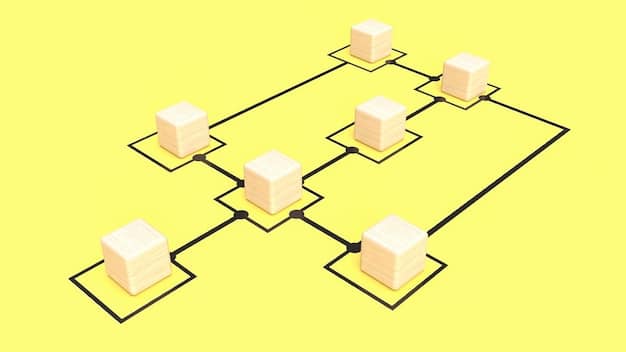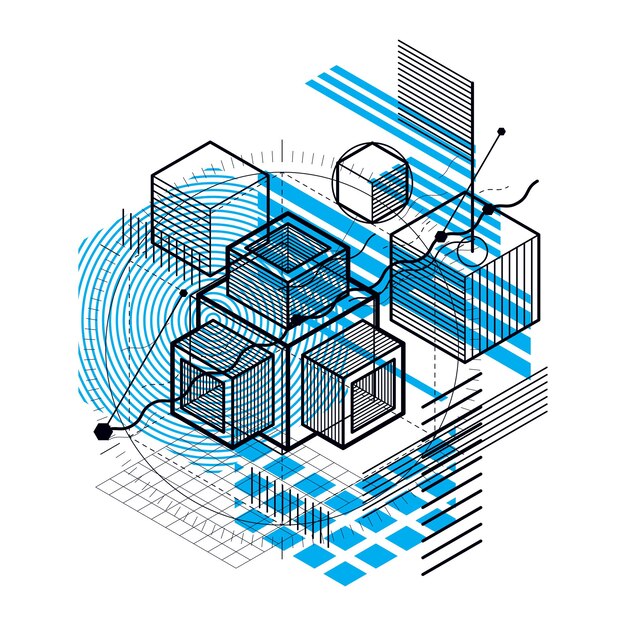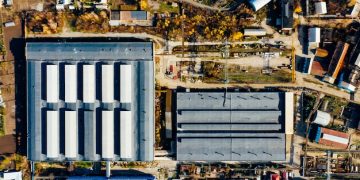Blockchain Technology: Securing US Logistics Supply Chain

Blockchain technology offers a decentralized and transparent solution to enhance the security and efficiency of the US logistics supply chain by providing immutable records, improved traceability, and reduced fraud.
The US logistics supply chain faces numerous challenges, including inefficiencies, security vulnerabilities, and lack of transparency. Blockchain technology emerges as a promising solution to address these issues, offering enhanced security, traceability, and efficiency across the entire supply chain network. Let’s delve into how blockchain can revolutionize the future of logistics.
Understanding Blockchain Technology
Blockchain is a revolutionary technology gaining traction across various industries, but what exactly is it? In simple terms, it’s a decentralized, distributed, and immutable ledger that records transactions across many computers.
Each transaction is grouped into a “block,” and these blocks are linked together in a chronological chain, hence the name “blockchain.” This structure ensures transparency and security, making it extremely difficult to alter or tamper with the data.
Key Features of Blockchain
Blockchain’s unique characteristics make it particularly well-suited for applications requiring high levels of security and transparency.
- Decentralization: No single entity controls the blockchain, reducing the risk of censorship or manipulation.
- Transparency: All participants can view the transaction history, promoting trust and accountability.
- Immutability: Once a transaction is recorded, it cannot be altered or deleted, ensuring data integrity.
- Security: Cryptographic techniques secure the blockchain, making it resistant to hacking and fraud.
These features of blockchain provide a strong foundation for transforming traditional logistics systems into more secure and efficient operations.

Current Challenges in the US Logistics Supply Chain
The US logistics supply chain is a complex network involving numerous stakeholders, processes, and technologies. However, it faces several persistent challenges that hinder its efficiency and security.
These challenges range from inefficiencies in tracking and tracing goods to vulnerabilities in data security and susceptibility to fraud.
Lack of Transparency and Traceability
One of the major issues is the lack of transparency and traceability throughout the supply chain. Information silos and fragmented systems make it difficult to track goods from origin to destination.
This lack of visibility can lead to delays, errors, and increased costs, as well as difficulties in verifying the authenticity and integrity of products.
Security Vulnerabilities and Fraud
The traditional logistics supply chain is also vulnerable to security breaches and fraudulent activities. Counterfeit goods, theft, and data manipulation are common occurrences, resulting in significant financial losses and reputational damage.
- Counterfeit goods can infiltrate the supply chain, posing risks to consumers and damaging brand reputation.
- Theft of goods during transit is a persistent problem, particularly in high-value industries.
- Data manipulation can occur at various points in the supply chain, leading to inaccurate records and fraudulent claims.
Addressing these challenges is crucial for improving the resilience and competitiveness of the US logistics supply chain.
How Blockchain Can Enhance Security
Blockchain technology offers several ways to enhance security in the US logistics supply chain. Its decentralized and immutable nature makes it a formidable tool against fraud, counterfeiting, and data breaches.
By implementing blockchain-based solutions, companies can create a more secure and transparent environment for their logistics operations.
Immutable Records
One of the key benefits of blockchain is its ability to create immutable records of all transactions. Once a transaction is recorded on the blockchain, it cannot be altered or deleted, ensuring data integrity and preventing fraud.
This feature is particularly valuable in tracking the movement of goods, as it creates a tamper-proof audit trail that can be used to verify the authenticity and integrity of products.
Improved Traceability
Blockchain also enhances traceability by providing a shared, transparent ledger that all participants in the supply chain can access. This allows companies to track goods from origin to destination in real-time, reducing the risk of theft and counterfeiting.
- Improved tracking of goods throughout the supply chain.
- Reduced risk of theft and loss.
- Enhanced ability to verify the authenticity of products.
Smart Contracts
Smart contracts, self-executing contracts written in code, can automate and enforce agreements between parties in the supply chain. This reduces the need for intermediaries and minimizes the risk of disputes and fraud.
For example, a smart contract could automatically release payment to a supplier once goods are delivered and verified, eliminating the need for manual verification and reconciliation.

Real-World Applications of Blockchain in Logistics
Several companies are already exploring and implementing blockchain-based solutions in the logistics industry. These applications demonstrate the potential of blockchain to transform the way goods are tracked, managed, and delivered.
From tracking pharmaceuticals to verifying the origin of agricultural products, blockchain is proving its value in enhancing security and efficiency.
Tracking Pharmaceuticals
The pharmaceutical industry is particularly vulnerable to counterfeiting and theft. Blockchain can help address these issues by providing a secure and transparent way to track pharmaceuticals from manufacturer to patient.
For example, companies like IBM and Merck are using blockchain to track and trace pharmaceuticals, ensuring the authenticity and integrity of drugs and preventing counterfeit products from entering the supply chain.
Verifying Agricultural Products
Blockchain can also be used to verify the origin and quality of agricultural products. This is particularly important for consumers who are increasingly concerned about the provenance and sustainability of their food.
Walmart, for instance, uses blockchain to track the origin of mangoes, allowing them to quickly identify and remove contaminated products from the shelves, protecting consumers and reducing food waste.
Through various applications, blockchain is revolutionizing how logistics are being approached, especially regarding security and safety.
Challenges and Considerations for Implementation
While blockchain technology holds great promise for enhancing security in the US logistics supply chain, there are also challenges and considerations that companies need to address during implementation.
Scalability, regulatory hurdles, and interoperability are among the factors that can impact the successful deployment of blockchain-based solutions.
Scalability
One of the main challenges is scalability. As the number of transactions increases, the blockchain network can become congested, leading to slower processing times and higher transaction fees.
- Limited transaction processing capacity.
- Potential for network congestion and delays.
- Need for scalable blockchain solutions.
Regulatory Hurdles
The regulatory landscape for blockchain is still evolving, and companies may face uncertainty and compliance challenges when implementing blockchain-based solutions. Different jurisdictions may have different rules and regulations regarding the use of blockchain, making it difficult to navigate the legal framework.
Interoperability
Interoperability is another key consideration. For blockchain to be truly effective, different blockchain networks and systems need to be able to communicate and exchange data seamlessly.
Without interoperability, companies may be locked into proprietary systems, limiting the benefits of blockchain.
| Key Point | Brief Description |
|---|---|
| 🔒 Enhanced Security | Blockchain’s immutability reduces fraud and data breaches in logistics. |
| 🚚 Improved Traceability | Real-time tracking from origin to destination minimizes theft and counterfeiting. |
| 🤝 Smart Contracts | Automated agreements reduce intermediaries and disputes in supply chain processes. |
| 🌐 Decentralization | Decentralization enhances trust and provides accountability in the logistics network. |
Frequently Asked Questions
▼
Blockchain is a decentralized, distributed, and immutable ledger that records transactions across many computers, ensuring transparency and security. Each transaction is grouped into a “block,” and these blocks are linked together in a chronological chain.
▼
Blockchain enhances supply chain security by creating immutable records, improving traceability, and automating agreements through smart contracts. This reduces the risk of fraud, counterfeiting, and data breaches.
▼
The main challenges include scalability issues, regulatory hurdles, and the need for interoperability between different blockchain networks and systems. Overcoming these challenges is crucial for successful deployment.
▼
Yes, blockchain can significantly reduce the risk of counterfeit goods by providing a transparent and tamper-proof way to track products from origin to destination, verifying their authenticity at each step.
▼
Real-world applications include tracking pharmaceuticals, verifying the origin of agricultural products, and automating payment processes through smart contracts. Companies like Walmart and IBM are already implementing these solutions.
Conclusion
Blockchain technology has the potential to transform the security and efficiency of the US logistics supply chain. While there are challenges to overcome, the benefits of enhanced security, improved traceability, and reduced fraud make it a promising solution for the future of logistics. As more companies explore and implement blockchain-based solutions, the US logistics supply chain is poised to become more resilient, transparent, and secure.





